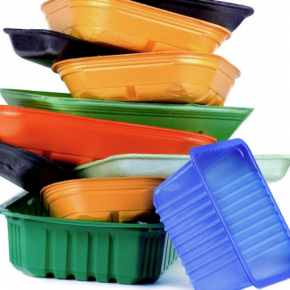
Targets for recycled content in food packaging need care say Axion
Although setting minimum targets for recycled content in food packaging sounds like a good idea, Richard McKinlay, Head of Circular Economy at resource recovery specialist Axion, believes it could lead to less efficient use of resources if material types and their applications are not carefully considered.
====================
“It’s widely acknowledged that to make recycling more economically viable, an end market ‘pull-effect’ is needed to create the demand for recycled material. Setting minimum ‘recycled content’ targets is one way of stimulating this demand.
“Minimum ‘recycled content’ targets would be a positive step for many products, such as automotive parts, groundworks, piping and, in some cases, packaging. However, this approach could be counter-productive in areas such as polypropylene (PP) food packaging.
“The technology and infrastructure is not currently available to produce food grade recycled PP from post-consumer household packaging. As a result, if minimum targets are introduced, in the short term, manufacturers would have to move from PP into polyethylene terephthalate (PET).
“However, this presents a key issue with PET in pots, tubs and tray applications. As several WRAP studies have shown, the lower quality of PET recycled from pots, tubs and trays makes it unsuitable for many end-use applications.
“This means you might substitute a recyclable pack that’s good in every other way, but without recycled content, for a pack that may not be as good for recycling yet has recycled content.
“Established markets for recycled PP already exist, such as automotive parts and furniture, and these markets can more easily increase recycled content than in packaging applications.
“Although research is being done into sorting material using markers to sort food contact from non-food contact PP packaging, and PET thermoform recycling is progressing; in the short term brands, retailers and converters should be able to continue using PP without recycled content – and not be penalised for doing so.
“Furthermore, I feel that given the challenges of including recycled content in flexible packaging, a minimum target would be a retrograde step.
“Manufacturers would be tempted to move back to rigid materials, such as glass or aluminium, which may impact negatively on the complete product lifecycle, through higher transportation costs for example.
“Currently, we are in an interesting position where more effort is being put into developing recycling systems and the use of recycled materials. However, we cannot keep switching material format.
“It’s important that we do the best we can with current infrastructure based on complete product lifecycle economics.
“Food safety is the most crucial aspect of packaging; perhaps we should encourage a circular economy approach where virgin polymer is used in food packaging, which is then recycled into non-food packaging and other long-life products.
“It’s all about creative thinking around end applications and not worrying so much about closed-loop recycling. The automotive sector offers a big potential market for flexible PP in new end products, as well as secondary packaging applications, such as plastic delivery envelopes.
“In the future, targets will be a great help, but we’re not quite there yet. We must ensure that we don’t take ‘one step forward and two steps back’.”
=======================
Axion develops and operates innovative resource recovery and processing solutions for recycling waste materials. Its team have specialist expertise in packaging recycling and can provide a packaging recyclability training service to help clients better understand current infrastructure and packaging options in terms of circular economy and end-of-life solutions.
Axion works with a wide range of clients, from Government agencies and local authorities to companies in diverse commercial sectors, on the practical development of new processing and collection methods to recover value from waste resources.
Latest news

11th April 2025
Don’t Do a Dave! It’s Time to Lock FIT Show 2025 in Your Calendar!
It’s that time again – FIT Show is back! You could be forgiven for thinking there won’t be much new to see when FIT Show returns to the NEC from 29 April – 1 May. Wrong!
Posted in Articles, Building Industry Events, Building Industry News, Building Products & Structures, Building Services, Continuing Professional Development (CPD's), Exhibitions and Conferences, Information Technology, Innovations & New Products, Restoration & Refurbishment, Retrofit & Renovation, Seminars, Training
11th April 2025
Insight Data: Boost construction success with project and prospect data
For those working in construction – in whatever capacity – the last few years haven’t been much fun. And according to the latest statistics, it would seem the challenges are continuing – Alex Tremlett, Insight Data’s Commercial Director, has more…
Posted in Articles, Building Industry News, Building Services, Information Technology, news, Research & Materials Testing
11th April 2025
ASSA ABLOY EMEIA: Learn how to tackle the security challenges of digitalising access with insights from industry experts
In a new series of videos, experts in various specialisms within ASSA ABLOY share their expertise on digital access, including the complexities to overcome and the range of benefits for those who get digital access right…
Posted in Access Control & Door Entry Systems, Architectural Ironmongery, Articles, Building Industry News, Building Products & Structures, Building Services, Doors, Facility Management & Building Services, Information Technology, Innovations & New Products, Posts, Restoration & Refurbishment, Retrofit & Renovation, Security and Fire Protection, Videos
10th April 2025
Geberit completes 150 Acts of Kindness
Geberit has raised nearly £14,000 for various charities through its ‘150 Acts of Kindness’ initiative, a year-long programme of fundraising and volunteering to mark the company’s 150th anniversary in 2024.
Posted in Articles, Bathrooms & Toilets, Bathrooms, Bedrooms & Washrooms, Building Industry Events, Building Industry News, Building Products & Structures, Building Services, Charity work, Drainage, Interiors, Pipes, Pipes & Fittings, Plumbing, Restoration & Refurbishment, Retrofit & Renovation
 Sign up:
Sign up: